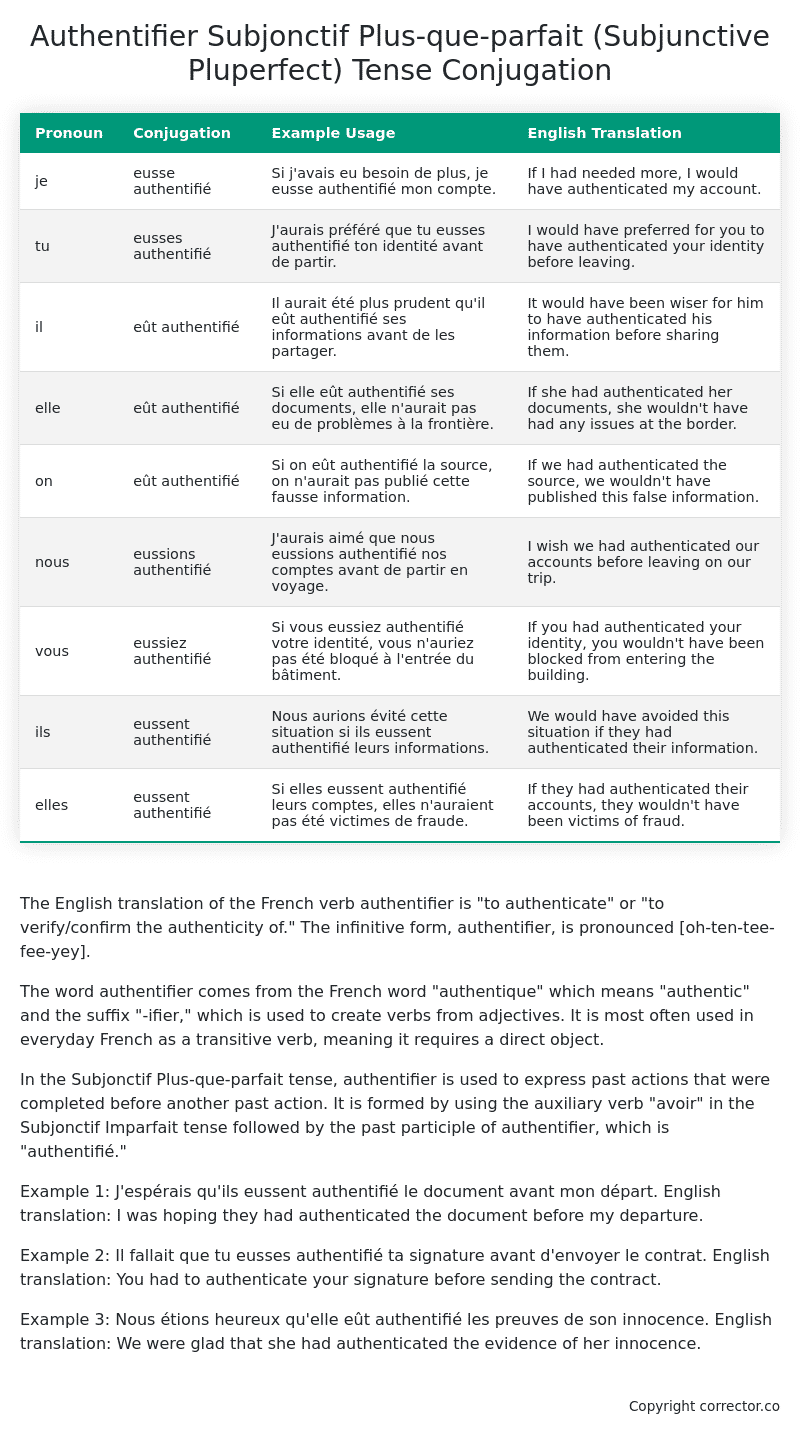Subjonctif Plus-que-parfait (Subjunctive Pluperfect) Tense Conjugation of the French Verb authentifier
Introduction to the verb authentifier
The English translation of the French verb authentifier is “to authenticate” or “to verify/confirm the authenticity of.” The infinitive form, authentifier, is pronounced [oh-ten-tee-fee-yey].
The word authentifier comes from the French word “authentique” which means “authentic” and the suffix “-ifier,” which is used to create verbs from adjectives. It is most often used in everyday French as a transitive verb, meaning it requires a direct object.
In the Subjonctif Plus-que-parfait tense, authentifier is used to express past actions that were completed before another past action. It is formed by using the auxiliary verb “avoir” in the Subjonctif Imparfait tense followed by the past participle of authentifier, which is “authentifié.”
Example 1: J’espérais qu’ils eussent authentifié le document avant mon départ.
English translation: I was hoping they had authenticated the document before my departure.
Example 2: Il fallait que tu eusses authentifié ta signature avant d’envoyer le contrat.
English translation: You had to authenticate your signature before sending the contract.
Example 3: Nous étions heureux qu’elle eût authentifié les preuves de son innocence.
English translation: We were glad that she had authenticated the evidence of her innocence.
Table of the Subjonctif Plus-que-parfait (Subjunctive Pluperfect) Tense Conjugation of authentifier
| Pronoun | Conjugation | Example Usage | English Translation |
|---|---|---|---|
| je | eusse authentifié | Si j’avais eu besoin de plus, je eusse authentifié mon compte. | If I had needed more, I would have authenticated my account. |
| tu | eusses authentifié | J’aurais préféré que tu eusses authentifié ton identité avant de partir. | I would have preferred for you to have authenticated your identity before leaving. |
| il | eût authentifié | Il aurait été plus prudent qu’il eût authentifié ses informations avant de les partager. | It would have been wiser for him to have authenticated his information before sharing them. |
| elle | eût authentifié | Si elle eût authentifié ses documents, elle n’aurait pas eu de problèmes à la frontière. | If she had authenticated her documents, she wouldn’t have had any issues at the border. |
| on | eût authentifié | Si on eût authentifié la source, on n’aurait pas publié cette fausse information. | If we had authenticated the source, we wouldn’t have published this false information. |
| nous | eussions authentifié | J’aurais aimé que nous eussions authentifié nos comptes avant de partir en voyage. | I wish we had authenticated our accounts before leaving on our trip. |
| vous | eussiez authentifié | Si vous eussiez authentifié votre identité, vous n’auriez pas été bloqué à l’entrée du bâtiment. | If you had authenticated your identity, you wouldn’t have been blocked from entering the building. |
| ils | eussent authentifié | Nous aurions évité cette situation si ils eussent authentifié leurs informations. | We would have avoided this situation if they had authenticated their information. |
| elles | eussent authentifié | Si elles eussent authentifié leurs comptes, elles n’auraient pas été victimes de fraude. | If they had authenticated their accounts, they wouldn’t have been victims of fraud. |
Other Conjugations for Authentifier.
Le Present (Present Tense) Conjugation of the French Verb authentifier
Imparfait (Imperfect) Tense Conjugation of the French Verb authentifier
Passé Simple (Simple Past) Tense Conjugation of the French Verb authentifier
Passé Composé (Present Perfect) Tense Conjugation of the French Verb authentifier
Futur Simple (Simple Future) Tense Conjugation of the French Verb authentifier
Futur Proche (Near Future) Tense Conjugation of the French Verb authentifier
Plus-que-parfait (Pluperfect) Tense Conjugation of the French Verb authentifier
Passé Antérieur (Past Anterior) Tense Conjugation of the French Verb authentifier
Futur Antérieur (Future Anterior) Tense Conjugation of the French Verb authentifier
Subjonctif Présent (Subjunctive Present) Tense Conjugation of the French Verb authentifier
Subjonctif Passé (Subjunctive Past) Tense Conjugation of the French Verb authentifier
Subjonctif Imparfait (Subjunctive Imperfect) Tense Conjugation of the French Verb authentifier
Conditionnel Présent (Conditional Present) Tense Conjugation of the French Verb authentifier
Conditionnel Passé (Conditional Past) Tense Conjugation of the French Verb authentifier
L’impératif Présent (Imperative Present) Tense Conjugation of the French Verb authentifier
L’infinitif Présent (Infinitive Present) Tense Conjugation of the French Verb authentifier
(this article)
Struggling with French verbs or the language in general? Why not use our free French Grammar Checker – no registration required!
Get a FREE Download Study Sheet of this Conjugation 🔥
Simply right click the image below, click “save image” and get your free reference for the authentifier Subjonctif Plus-que-parfait tense conjugation!

Authentifier – About the French Subjonctif Plus-que-parfait (Subjunctive Pluperfect) Tense
Formation
Common Everyday Usage Patterns
Hypothetical Situations
Reported Speech
Doubt, Wishes, and Emotions
Interactions with Other Tenses
Present Subjunctive
Imperfect Subjunctive
Conditional
Summary
I hope you enjoyed this article on the verb authentifier. Still in a learning mood? Check out another TOTALLY random French verb conjugation!


